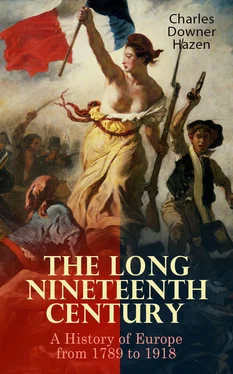1 ...6 7 8 10 11 12 ...35 The condition of the vast mass of the people in every country was the thing least considered. It was everywhere deplorable, though varying more or less in different countries. The masses, who were peasants, were weighed down and hemmed in by laws and institutions and customs that took no account of their well-being. In one way or another they were outrageously taxed, so that but a small fraction of what they earned went for their own support. Throughout most of Europe they did not possess what we regard as the mere beginnings of personal liberty, for, except in England and France, serfdom, with all its paralyzing restrictions, was in force. No one dreamed that the people were entitled to education so that they might be better equipped for life. The great substructure of European society was an unhappy, unfree, unprotected, undeveloped mass of human beings, to whom opportunity for growth and improvement was closed on every side.
If the governments of Europe did not seriously consider the interest of the most numerous and weakest class, on whose well-being depended absolutely the ultimate well-being of the nations, did they discharge their other obligations with any greater understanding or sense of justice? It cannot be said that they did. The distempers in every state were numerous and alarming. The writings of contemporaries abound in gloomy prophecies. There was a widespread feeling that revolutions, catastrophes, ruin were impending, that the body politic was nowhere in sound condition Excessive expenditures for the maintenance of extravagant courts, for sumptuous buildings, for favorites of every stripe and feather, excessive expenditures for armies and for wars, which were frequent, resulted in increasing disorder in the finances of the various nations. States resorted more and more to loans with the result that the income had to go for the payment of the interest. Deficits were chronic, and no country except England had a budget, or public and official statement of expenditures and receipts. Taxes were increasing and were detestably distributed. Everywhere in Europe the richer a man was the less he paid proportionately. As new taxes were imposed, exemptions, complete or partial, went with them, and the exemptions were for the nobility and, in part, for the middle classes, where such existed. Crushing therefore was the burden of the lower orders. It was truly a vicious circle.
These evils were so apparent that now and then they prompted the governing authorities to attempt reform. Several rulers in various countries made earnest efforts to improve conditions. These were the 'benevolent despots' of the eighteenth century who tried reform from above before the French tried it from below. On the whole they had no great or permanent success, and the need of thoroughgoing changes remained to trouble the future.
Not only were the governments of Europe generally inefficient in all that concerned the full, symmetrical development of the economic, intellectual, and moral resources of the people, not only were they generally repressive and oppressive, allowing little scope to the principle of liberty, but they were, in their relations to each other, unprincipled, unscrupulous. The state was conceived as force, not at all as a moral being, subject to moral obligations and restraints. The glory of rulers consisted in extending the boundaries of their states, regardless of the rights of other peoples, regardless even of the rights of other rulers. The code that governed their relations with each other was primitive indeed. Any means were legitimate, success was the only standard of right or wrong. "He who gains nothing, loses," wrote Catherine of Russia, one of the 'enlightened' despots. The dominant idea in all government circles was that the greatness of the state was in proportion to its territorial extent, not in proportion to the freedom, the prosperity, the education of its people. The prevalence of this idea brought it about that every nation sought to be ready to take advantage of any weakness or distress that might appear in the situation of its neighbors. Armies must be constantly at hand and diplomacy must be ready for any scurvy trick or infamous crime that might promise hope of gain. It followed that treaties were to be broken whenever there was any advantage in breaking them. "It is a mistake to break your word without reason," said Frederick II, "for thus you gain the reputation of being light and fickle." To keep faith with each other was no duty of rulers. There was consequently no certainty in international agreements.
This indifference to solemn promises was nothing new. The eighteenth century was full of flagrant violations of most explicit international agreements. There was no honor among nations. No state had any rights which any other state was bound to respect. These monarchs, 'enlightened' and 'benevolent' or not, as the case might be, all agreed that they ruled by divine right, by the will of God. Yet this decidedly imposing origin of their authority gave them no sense of security in their relations with each other, nor did it give to their reigns any exceptional purity or unworldly character. The maxims of statecraft which they followed were of the earth, earthy. While bent upon increasing their own power they did not neglect the study of the art of undermining each other's power, however divinely buttressed in theory it might be. Monarchs were dethroned, states were extinguished, boundaries were changed and changed again, as the result of aggressive wars, during the eighteenth century. Moreover, the wars of that time were famous for the exactions of the victors and for the scandalous fortunes made by some of the commanders. It was not the French Revolutionists nor was it Napoleon who introduced these customs into Europe. They could not, had they tried, have lowered the tone of war or statecraft in Europe. At the worst they might only imitate their predecessors.
The Old Regime in Europe was to be brought tumbling down in unutterable confusion as a result of the storm which was brewing in Old France and which we are now to study. But that regime had been undermined, the props that supported it had been everywhere destroyed, by its own official beneficiaries and defenders.
The Old Regime was disloyal to the very principles on which it rested, respect for the established order, for what was old and traditional, for what had come down from the past, regard for legality, for engagements, loyalty to those in authority. How little regard the monarchs of Europe themselves had for principles which they were accustomed to pronounce sacred, for principles in which alone lay their own safety, was shown by the part they played in the great events of the eighteenth century already alluded to, the war of the Austrian Succession, and the Partition of Poland. By the first the ruler of Austria, Maria Theresa, was robbed of the large and valuable province of Silesia by Prussia, aided by France, both of which states had recently signed a peculiarly solemn treaty called the Pragmatic Sanction, by which her rights had been explicitly and emphatically recognized. Frederick II, however, wanted the province, took it, and kept it. This case shows how lightly monarchs regarded legal obligations, when they conflicted with their ambitions.
The other case, the Partition of Poland, was the most iniquitous act of the century. Poland was in geographical extent the largest state in Europe, next to Russia. Its history ran far back. But its government was utterly weak.
Therefore in 1772 Prussia, Austria, and Russia attacked it for no cause save their own cupidity, and tore great fragments away, annexing Poland them to their own territories. Twenty years later they completed the process in two additional partitions, in 1793 and 1795, thus entirely annihilating an ancient state. This shows how much regard the monarchs of Europe had for established institutions, for established authorities.
Читать дальше












